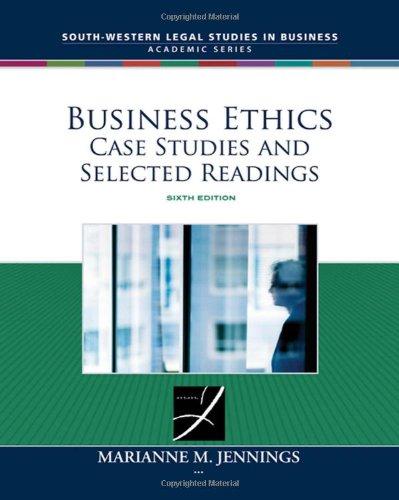Submitted by literature on

In this sixth edition of the book the author, who also wrote The Seven Signs of Ethical Collapse, compiled and analysed 116 case studies, while also provided a further information about the topic in selected readings. The topics inspect the relations between corporations, public, governments, as well as employees and employer dynamics. Author also supplies discussion questions after each case study, to make reader truly consider the situation.
In the first unit, the book scrutinises the definition of ethics itself. What are they, why do we need them and how to deal with ethical dilemmas in our life. The book recommends creating our own personal credo, which should make us think about who we are and what are our standards and ethical limits. When it comes to ethics itself, we quickly realize that there is a difference between law and ethics. Our society is governed by the rule of law and yet most of our behaviour does not necessarly strictly follow the law. Majority of people have higher standards, rules, that even when broken do not carry legal consequences. Whether it is queueing in line while waiting for something, or cheating at exams, in relationship or marriage. Many philosophers tried to answer the question, where do these ethics come from, what is their goal and how should we enforce them. Some of the notable theories are:
- Divine command theory – the believe in divine being(s) which guide us towards ethical behaviour
- Ethical Egoism theory – our ethical behaviour purely comes from our self-interest and fear of being punished by others if we won't follow them
- The Utilitarian theory – strives to maximise hapinness in society in a balance between rights and demands
- Rights theory – rights are intrinsic to everyone and it's governments role to protect them
- Moral Relativism – our deeds have to be put into context and everybody has a different goals
- Virtue Ethics – created by Plato and Aristotle, a person should develop positive virtues and use them to solve ethical dilemmas
The author also highlights different types of ethical dilemmas we come into touch with everyday. Lying or even allowing false impressions to persist, taking advantage, permitting abuse to happen, etc. are all things that fall into area where law does not operate properly. We also need to know how to not hide these dilemmas behind excuses. If our standards come from a reason and they are absolute, then it doesn't matter whether everybody else is breaking them, or they are not punishable by law, we have been ordered to do so, or they don't create immediate harm to somebody, something. One thing I respectfully disagree with author is the statement that breaking the law (whose, whether company's or goverment's, doesn't matter) is a ethical breach. This for me is inconsistent with absolute ethical values, because if the law breaks the ethical standards then following it would be wrong..
There are different models to solving ethical dilemmas, usually consisting of set of questions, which try to make sure our standards are consistent and sustainable. But there are simpler models as well, as the old saying goes “Do unto others as you would have them do unto you”.
Second unit then deals with the definition of business ethics and how it differs from personal, or whether it differs at all. Next units then go over various areas of business ethics and use case studies as a help to better understand the dilemmas companies and their employees had to resolve.
Jan S.


